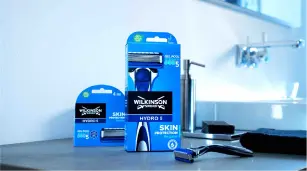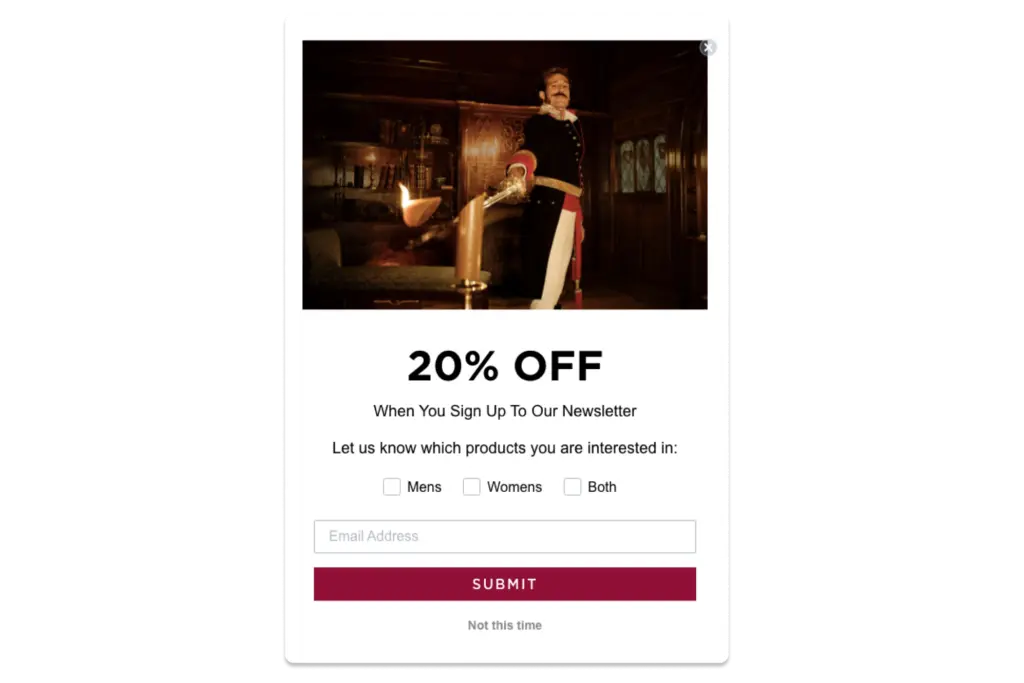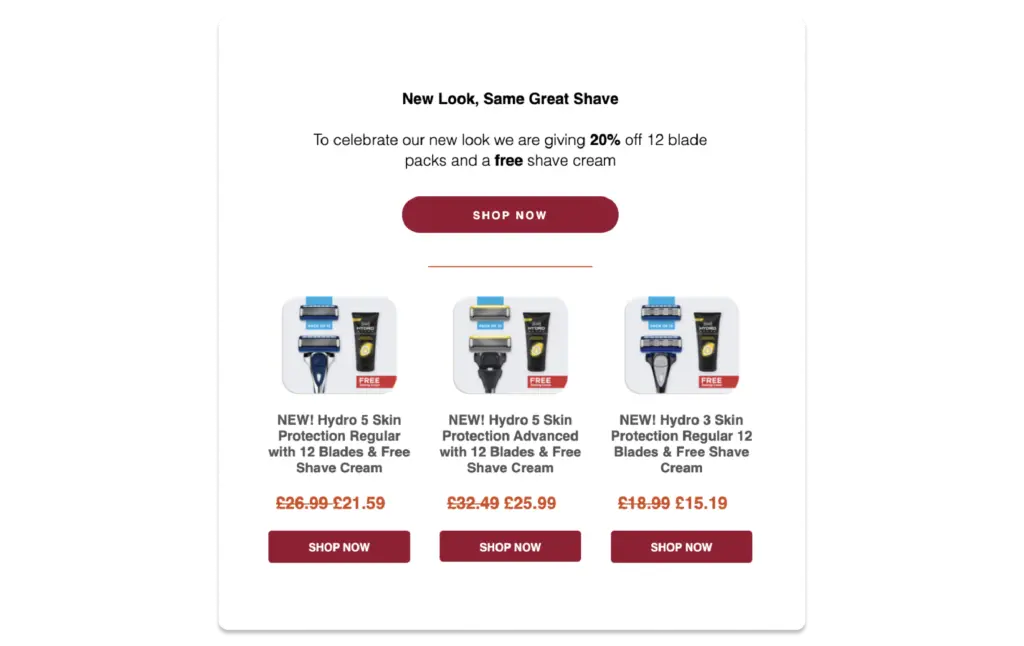How a centuries-old razor brand drives cutting-edge email engagement through personalisation

67%
of all purchases driven by email
39%
purchase rate for email welcome series
16%
click rate for abandoned cart flow
Wilkinson Sword (part of the larger personal care brand Edgewell) is a commonly known name in the UK—after all, it’s been around for nearly 250 years. More than just a household name, the Wilkinson Sword brand still resonates with people, even amid the rise of newer brands that also offer razor subscriptions.
So how has this brand stood the test of time? By embracing their heritage and keeping trust as the core value that has led their strategy from 1772 into the digital age.
Throughout Wilkinson Sword’s history, we’ve created swords, guns and motorcycles. It’s quite a crazy mix. Over the past 250 years we’ve focused on blades—swords at the start and razors today. Quality has been at the heart of everything we’ve done over the past 250 years, that’s bred trust in our brand which is massively important to both us and our customers.
Ben Ford, Direct-to-Consumer Manager, Edgewell
Ben and John recently shared some of the key drivers behind how they’ve driven 67 percent of all revenue with email—and why Klaviyo is their marketing platform of choice.
How to digitally honour a heritage brand’s authenticity
Wilkinson Sword’s brand focuses on education and honesty, rather than creating hype around flashy products—and this translates directly to their marketing strategy.
I think brands can easily flaunt that word ‘authenticity’ around, but we are what we are. We’d rather focus our campaigns on meeting consumer needs and letting the quality of our products speak for themselves rather than rely on sports stars to buy us credibility. We’re just ourselves and we stick to those values.
Ben Ford, Direct-to-Consumer Manager, Edgewell
True to their brand roots, even the team’s response to the trend of razor subscriptions shows they aren’t swayed from how they want to show up for their customers.
There’s a lot of noise around razor subscriptions. If our customers want to use subscriptions, that’s an option on our site. But, for us, it’s all about trying to give them as much flexibility as possible, so we don’t push the subscription hard.
Ben Ford, Direct-to-Consumer Manager, Edgewell
Far from getting stuck in the past, the team at Wilkinson Sword uses their history and customer trust to continue building relationships online. So how does the Wilkinson Sword team create content fitting for a reputable heritage brand?
Our promise to our customers is to give them not only the best deals and high-quality products, but also the best, most personalised content on how to use our products.
Ben Ford, Direct-to-Consumer Manager, Edgewell
Personalisation is a cornerstone of Wilkinson Sword’s strategy to capture the same level of customer trust they’ve had for centuries. In fact, the team has tailored each stage of their customer’s journey to ensure the best possible ecommerce experience.
Read on to learn how Wilkinson Sword delights customers through targeted, relevant marketing—from someone’s first purchase to becoming a loyal brand advocate.
How Wilkinson Sword personalises the brand experience with a better customer experience
From the first touch point, Wilkinson Sword wants to set people up for a highly relevant customer experience—which starts with the form on their website they use to capture new subscribers.
We were starting to plateau with our signup numbers a few months ago, so we optimised our form by creating different versions for desktop and mobile. It was a simple fix, but our submit rate went from around two percent to nine percent on mobile.
John Pagni, Ecommerce Assistant, Edgewell
Another critical element of Wilkinson Sword’s signup form—that also hits at the heart of their desire to build trust—is capturing data about customer preferences to serve up highly relevant content.
We recently added a field to our signup form. Now, when people subscribe, they can click whether they’re interested in male, female, or both products.
John Pagni, Ecommerce Assistant, Edgewell

Adding fields to a signup form can be risky—people might decide it’s not worth their time to fill in additional details and abandon the form altogether.
But when they weighed the value of having more data to personalise people’s experiences, the Wilkinson Sword team thought it might be worth losing submissions.
First-party data about what people are interested in helps us provide them with relevant content, so we’re willing to sacrifice a bit of conversion for that. But we actually haven’t seen a drop off yet.
John Pagni, Ecommerce Assistant, Edgewell
Using the data gathered in the form, the Wilkinson Sword team created a personalised welcome email series that yields a purchase rate of 39 percent. That means two out of five email recipients make a purchase—which would be a healthy email open rate, so it’s an eye-opening, mouth-dropping purchase rate.
Check out the three versions of their welcome email, each tailored to their customer’s interests based on how they completed the signup form.

Beyond the welcome email: How Wilkinson Sword keeps their content relevant and fresh
Wilkinson Sword’s focus on delivering relevant content doesn’t end with their welcome email.
Since the Wilkinson Sword team runs their online store on WooCommerce, they can connect their website data to their marketing messages in Klaviyo to create ongoing customer journeys based on how people interact with their website.
With our WooCommerce integration, automated series like abandoned cart emails are super easy to make. Coding all the tags into our HTML email templates is really simple. That’s what I use most with the integration, and it’s a dream.
John Pagni, Ecommerce Assistant, Edgewell
To create a more personalised customer experience, Wilkinson Sword’s abandoned cart email—the message that sends after someone adds something to their online cart but doesn’t check out—includes a product image of what the shopper had placed in their cart.

This abandoned cart email drives an astounding 15.9 percent click rate, proving the value of detail-oriented personalisation.
Plus, with the time the team saves by creating automated emails, they’re able to explore not-so-traditional methods of retargeting to remind customers about a particular campaign or product.
We retarget people based on what they’ve clicked within an email. After they click, we send them another email that’s directly related to what they expressed an interest in. Through that we get really high open rates—around 60 percent—and also a really strong conversion rate.
John Pagni, Ecommerce Assistant, Edgewell
To see this in action, check out this excerpt from one of their email campaigns:

Based on what product people click on, the follow-up email will feature a personalised image. Someone who clicks on the Hydro 3 razor on the right, for example, would get this retargeting email:

In addition to how they target their email messages, the Wilkinson Sword team carefully crafts and tests their subject lines to get as many people as possible to engage with their emails.
Every subject line should grab attention, show the benefit, and also pique curiosity. We try to include two of those principles in every subject line. Plus, through testing, we’ve found that using a customer’s first name adds to that personalisation and increases the open rate of our automated emails.
John Pagni, Ecommerce Assistant, Edgewell
How Wilkinson Sword makes sure they don’t spam unengaged subscribers
Yet another contributor to Wilkinson Sword’s impressive growth and brand reputation is their attention to list hygiene—which is a measure of how many wrong emails/unengaged subscribers are on an email list.
For them, it’s more important to have high-quality customer engagement than a massive list of people made up of many who may ignore their emails.
Along with using double opt-in—which asks people who sign up to confirm their email subscription—the team at Wilkinson Sword has set up several automated ways of ensuring the people on their email lists actually want to hear from them.
We set up a hard and soft bounce segment, which we exclude from all our campaigns to keep engagement high. Sending an email that doesn’t even go through is basically a waste of an email send, so it’s not worth it.
John Pagni, Ecommerce Assistant, Edgewell
Plus, Wilkinson Sword has automated how they cull out subscribers who have valid email addresses but who aren’t engaging with their content.
If somebody hasn’t been engaging with us for about 10 emails, we send them a final hurrah-style email. We offer them a discount, but if they aren’t interested by then, we suppress them.
John Pagni, Ecommerce Assistant, Edgewell
This strategy ensures that Wilkinson Sword has a healthy email sender reputation—which email providers use to determine if an email sender is high quality or spam—and also keeps their data clean so they can accurately measure how people who are truly interested in their brand interact with their content.
What’s next for Wilkinson Sword?
Wilkinson Sword has adapted the best of their past to fit the modern age—so it’s no surprise that historical data is at the heart of their ongoing marketing strategy.
We’re a year and half into doing a deep dive into all of our data. We’re looking at the retention rates, the dropout rates, and also repurchasing.
Ben Ford, Direct-to-Consumer Manager, Edgewell
By sourcing this first-party data, Wilkinson Sword will have the ability to create even more personalised email journeys.
Once we have all of that data and we can narrow down the timings to ensure it doesn’t feel spammy to our customers, we’ll be able to create replenishment flows and even more targeted content.
John Pagni, Ecommerce Assistant, Edgewell